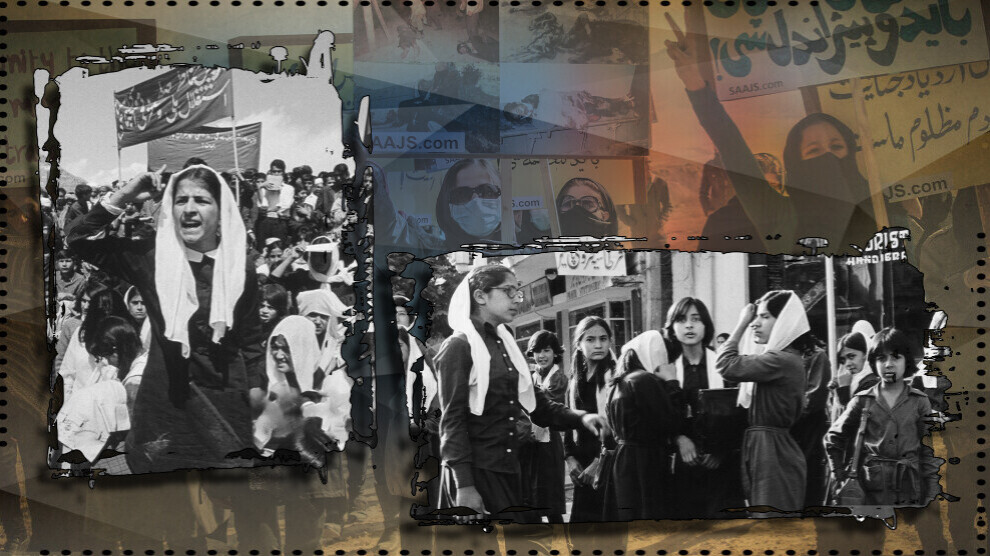History of Afghan women’s role in art and literature-Part 5
The Revolutionary Association of the Women of Afghanistan (RAWA) was founded in 1977 to promote women's rights and secular democracy in Afghanistan.

BAHARİN LEHİB
Kabil - Women’s movements for freedom have always been targeted by the dictatorial governments in the history of Afghanistan because they have always been seen as a threat.
After the end of the forty-year rule of Mohammed Zahir Shah in 1973, his cousin Mohammed Daoud Khan established the Republic of Afghanistan and proclaimed himself the first President of the Republic of Afghanistan. He was known for his autocratic rule and for his progressive social and economic reforms. During that period, some women’s organizations were founded. The Revolutionary Association of the Women of Afghanistan (RAWA), founded in 1977 as an independent political and social organization of Afghan women fighting for human rights and for social justice in Afghanistan, was one of them. The association was founded by Meena Keshwar Kamal, an Afghan student activist who was assassinated in February 1987 for her political activities.
NuJINHA conducted an interview with Nadia Aziz, one of Meena’s friends, about Meena and the RAWA.
Speaking about the influence of left-wing and progressive movements on Meena’s thoughts and ideas, Nadia Aziz said, “The freedom movements in the world definitely influenced Meena's thoughts. When I was a student at Kabul University, it was a period of prosperity for progressive movements in Afghanistan. At that time, America's shameful defeat in Vietnam made most Intellectual movements in the world, including in Afghanistan more determined in the struggle against imperialism and reaction. We can say that Vietnamese revolutionaries became a role model for Afghan women and youth. Meena was inspired by the struggle of Palestinian movements for justice and independence and the role of women in it. Also, the struggles of the left-wing and progressive forces in Iran, especially the revolutionary women of Iran, had the greatest impact on Meena and her other comrades.”
Nadia Aziz also talked about the social-political situation when Meena was active: “Afghanistan was in a period of prosperity for progressive movements when Meena was a student at Kabul University because the Kabul University was the heart of the movements. Students’ unions were mainly led by the Progressive Youth Organization, an anti-revisionist Marxist-Leninist organization in Afghanistan. The organization was founded in Kabul in 1944 and published Shalleh-ye Javid ('Eternal Flame') in 1947. Its followers were generally known as sholayes. Meena was also inspired by sholayes. In addition to the influence of local and international movements on her ideas and thoughts, we have to say that she understood the oppression and patriarchal system in Afghan society and wanted to change it. Eventually, she founded the Revolutionary Association of the Women of Afghanistan (RAWA) along with her comrades.”
A year after the establishment of the RAWA, a bloody coup d'état was staged in Afghanistan directed by Moscow in 1978. On the first anniversary of the coup, school students held a rally led by Meena against the puppet government of the Soviet Union. Security forces used violence against the protesters. Two female students named Naheed and Vajiheh were shot dead by the soldiers.
In 1981, Meena launched a bilingual feminist magazine, Payam-e-Zan (Women's Message).
Nadia Aziz added, “RAWA played an important role in the demonstrations against the Soviet invaders. Meena founded Watan Schools to aid refugee children and their mothers and to offer both hospitalization and the teaching of practical skills. The struggle of the RAWA did not end after the overthrow of the Soviet-installed puppet regime.”
During the 1992–1996 Afghan Civil War, many people were killed in Kabul. The Taliban emerged in September 1994 as one of the prominent factions in the Afghan Civil War. The Taliban captured many cities of Afghanistan and they captured Kabul in 1996. They forced compulsory hijab and prohibited women from leaving the house without a mahram (male escort), they even prohibited women from working and studying.
During that time, RAWA continued its struggle even more firmly, it was the only organization that documented and published reliable reports about the crimes of the Taliban.
Today, RAWA is known as a symbol of courage and fearlessness in Afghanistan, every Afghan woman who raises her voice against fundamentalists and criminals is accused of having a relationship with the RAWA.
